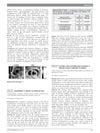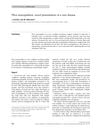 1 citations,
May 2022 in “Pharmaceutics”
1 citations,
May 2022 in “Pharmaceutics” Tea seed oil in nanostructured carriers stimulates hair growth and feels less greasy when applied.

YH0618 helps reduce chemotherapy-induced hair loss by targeting specific proteins and pathways.
April 2024 in “International journal of molecular sciences” Combination pharmacotherapy is generally more effective for treating keloids and hypertrophic scars.
 April 2024 in “Journal of translational medicine”
April 2024 in “Journal of translational medicine” MJ04, a new compound, effectively promotes hair growth and is a potential topical treatment for hair loss.
March 2023 in “Anais Brasileiros De Dermatologia” Topical minoxidil is the best-supported treatment for female hair loss, but personalized plans are needed.
 2 citations,
November 2023 in “Bioactive materials”
2 citations,
November 2023 in “Bioactive materials” New method improves copper peptide delivery for hair growth three times better than current options.
 13 citations,
September 2008 in “Experimental and Clinical Endocrinology & Diabetes”
13 citations,
September 2008 in “Experimental and Clinical Endocrinology & Diabetes” Young women with PCOS without additional risk factors may have normal heart function.

Ziziphus jujuba and Eclipta alba leaf extracts improve blood sugar levels and cognitive function in diabetic rats.
 8 citations,
July 2008 in “Facial Plastic Surgery Clinics of North America”
8 citations,
July 2008 in “Facial Plastic Surgery Clinics of North America” More men are getting non-surgical cosmetic treatments due to increased income and social acceptance, with less invasive options being preferred.
 1 citations,
July 2005 in “Informa Healthcare eBooks”
1 citations,
July 2005 in “Informa Healthcare eBooks” Hair follicles could be used for targeted drug delivery, with liposomal systems showing promise for this method.
 June 2003 in “Obstetrical & Gynecological Survey”
June 2003 in “Obstetrical & Gynecological Survey” Postmenopausal ovary stromal cells have a unique makeup and limited steroid production, suggesting androgens come from the adrenal gland.
 6 citations,
February 2021 in “Journal of Ovarian Research”
6 citations,
February 2021 in “Journal of Ovarian Research” 150 kHz electromagnetic radiation might help improve PCOS in rats.
 April 2023 in “JMIR Research Protocols”
April 2023 in “JMIR Research Protocols” The study aims to create a model to predict health attributes using diverse health data from Japanese adults.

Systemic lupus erythematosus is diagnosed earlier in males than females.
 46 citations,
August 2003 in “The journal of investigative dermatology/Journal of investigative dermatology”
46 citations,
August 2003 in “The journal of investigative dermatology/Journal of investigative dermatology” Phosphatidic acid may help hair grow by affecting cell growth pathways.
 14 citations,
August 2006 in “Clinical and Experimental Dermatology”
14 citations,
August 2006 in “Clinical and Experimental Dermatology” A girl with no hair neglect developed plica neuropathica in the hospital, lost all her hair, but it grew back.
 6 citations,
July 2021 in “Microbial biotechnology”
6 citations,
July 2021 in “Microbial biotechnology” The combined treatment with engineered bacteria and yellow LED light improved wound healing in mice.
 2 citations,
January 2019 in “Elsevier eBooks”
2 citations,
January 2019 in “Elsevier eBooks” Biotin supplements are unnecessary for most people but may help with certain conditions like biotin deficiency, brittle nails, and some hair loss.
 2 citations,
March 2005 in “Cancer biology & therapy”
2 citations,
March 2005 in “Cancer biology & therapy” Bexxar treatment led to a high response rate in patients with advanced-stage, treatment-resistant follicular lymphoma.
 April 2024 in “Cognizance journal”
April 2024 in “Cognizance journal” The alexandrite laser effectively reduces unwanted hair by about 75%.
 316 citations,
June 2004 in “The journal of investigative dermatology/Journal of investigative dermatology”
316 citations,
June 2004 in “The journal of investigative dermatology/Journal of investigative dermatology” Microspheres about 1.5 micrometers in size can best penetrate hair follicles, potentially reaching important stem cells.
 85 citations,
December 1990 in “Journal of Investigative Dermatology”
85 citations,
December 1990 in “Journal of Investigative Dermatology” Minoxidil promotes hair growth in women with early-stage alopecia.
 42 citations,
August 2017 in “Human Reproduction”
42 citations,
August 2017 in “Human Reproduction” Women with polycystic ovary syndrome tend to have a longer distance between the clitoris and anus.
 34 citations,
December 2012 in “Indian Journal of Dermatology, Venereology and Leprology”
34 citations,
December 2012 in “Indian Journal of Dermatology, Venereology and Leprology” Mesotherapy shows promise for cellulite and facial rejuvenation but has mixed results for body sculpting and hair loss, with more research needed for safety and effectiveness.
 32 citations,
December 2013 in “Biological & Pharmaceutical Bulletin”
32 citations,
December 2013 in “Biological & Pharmaceutical Bulletin” Rice bran extract can potentially treat hair loss by promoting hair growth and increasing the number of hair follicles.
 17 citations,
October 2012 in “Dermatologic clinics”
17 citations,
October 2012 in “Dermatologic clinics” Treating excessive hair in women requires a holistic approach, including medical, aesthetic, and emotional support.
 11 citations,
February 2019 in “Frontiers in Physiology”
11 citations,
February 2019 in “Frontiers in Physiology” Hair properties are interconnected; a comprehensive, cross-disciplinary approach is essential for understanding hair behavior.
 11 citations,
February 2008 in “British journal of nursing”
11 citations,
February 2008 in “British journal of nursing” Idiopathic hirsutism causes excessive hair growth in women, can be treated with medication and hair removal, but cannot be fully reversed.
 7 citations,
February 2018 in “International Journal of Pharmaceutics”
7 citations,
February 2018 in “International Journal of Pharmaceutics” Researchers developed a method to measure drugs in hair follicles and found that both water-loving and fat-loving drugs can be detected after being applied to the skin.
 6 citations,
January 2016 in “Evidence-based Complementary and Alternative Medicine”
6 citations,
January 2016 in “Evidence-based Complementary and Alternative Medicine” Boiling and fermenting certain herbs can help hair grow by activating hair growth genes and pathways.




























